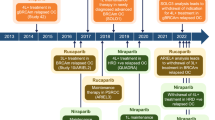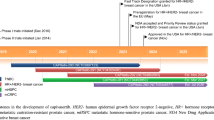Abstract
Lenvatinib (Lenvima®) is an oral, multi-targeted tyrosine kinase inhibitor (TKI) of vascular endothelial growth factor (VEGF) receptors 1, 2 and 3, fibroblast growth factor receptors 1, 2, 3 and 4, platelet-derived growth factor receptor alpha, and RET and KIT signalling networks, which are implicated in tumour growth and maintenance. In the EU and USA, lenvatinib is indicated for the treatment of locally recurrent or metastatic progressive, radioiodine-refractory differentiated thyroid cancer (RR-DTC). This approval was based on the results of the randomized, double-blind, multinational, phase 3 SELECT study, in which lenvatinib significantly improved median progression-free survival (PFS) and overall response rate compared with placebo in patients with RR-DTC. The PFS benefit with lenvatinib was seen in all pre-specified subgroups, including patients who had received either one or no prior VEGF-targeted therapy. Moreover, the PFS benefit with lenvatinib was maintained regardless of BRAF or RAS mutation status. The safety and tolerability profile of lenvatinib in SELECT was consistent with that of other VEGF/VEGF receptor-targeted therapies and was mostly manageable. Hypertension was the most common treatment-related adverse event in lenvatinib-treated patients, but only infrequently led to discontinuation of the drug. Although not collected in SELECT, information on quality of life would be useful in assessing the overall impact of therapy on the patient. This notwithstanding, the data which are available indicate that lenvatinib is an effective and generally well-tolerated treatment option for patients with RR-DTC. Lenvatinib, therefore, offers an acceptable alternative to sorafenib — currently, the only other TKI approved for this indication.


Similar content being viewed by others
References
Cancer ResearchUK. Thyroid cancer incidence in Europe and worldwide. http://www.cancerresearchuk.org. Accessed 4 Sep 2015.
EUCAN cancer factsheet: thyroid cancer. http://eco.iarc.fr. Accessed 4 Sep 2015.
SEER stat fact sheets: thyroid cancer http://seer.cancer.gov. Accessed 4 Sep 2015.
Jasim S, Ozsari L, Habra MA. Multikinase inhibitors use in differentiated thyroid carcinoma. Biol Tar Ther. 2014;8:281–91.
Worden F. Treatment strategies for radioactive iodine-refractory differentiated thyroid cancer. Ther Adv Med Oncol. 2014;6(6):267–79.
Brierley JD. Update on external beam radiation therapy in thyroid cancer. J Clin Endocrinol Metab. 2011;96(8):2289–95.
Busaidy NL, Cabanillas ME. Differentiated thyroid cancer: management of patients with radioiodine nonresponsive disease. J Thyroid Res. 2012. doi:10.1155/2012/618985.
Durante C, Haddy N, Baudin E, et al. Long-term outcome of 444 patients with distant metastases from papillary and follicular thyroid carcinoma: benefits and limits of radioiodine therapy. J Clin Endocrinol Metab. 2006;91(8):2892–9.
Robbins RJ, Wan Q, Grewal RK, et al. Real-time prognosis for metastatic thyroid carcinoma based on 2-[18F]fluoro-2-deoxy-D-glucose-positron emission tomography scanning. J Clin Endocrinol Metab. 2006;91(2):498–505.
Alonso-Gordoa T, Diez JJ, Duran M, et al. Advances in thyroid cancer treatment: latest evidence and clinical potential. Ther Adv Med Oncol. 2015;7(1):22–38.
Wang E, Karedan T, Perez CA. New insights in the treatment of radioiodine refractory differentiated thyroid carcinomas: to lenvatinib and beyond. Anti-Cancer Drugs. 2015;26(7):689–97.
Gómez-Sáez J-M. Treatment directed to signalling molecules in patients with advanced differentiated thyroid cancer. Anti Cancer Agents Med Chem. 2013;13(3):483–95.
Klein M, Vignaud JM, Hennequin V, et al. Increased expression of the vascular endothelial growth factor is a pejorative prognosis marker in papillary thyroid carcinoma. J Clin Endocrinol Metab. 2001;86(2):656–8.
Salajegheh A, Smith RA, Kasem K, et al. Single nucleotide polymorphisms and mRNA expression of VEGF-A in papillary thyroid carcinoma: potential markers for aggressive phenotypes. Eur J Surg Oncol. 2011;37(1):93–9.
Yu XM, Lo CY, Lam AK, et al. Serum vascular endothelial growth factor C correlates with lymph node metastases and high-risk tumor profiles in papillary thyroid carcinoma. Ann Surg. 2008;247(3):483–9.
Schlumberger M, Sherman SI. Approach to the patient with advanced differentiated thyroid cancer. Eur J Endocrinol. 2012;166:5–11.
Fallahi P, Ferrari SM, Mazzi V, et al. Personalization of targeted therapy in advanced thyroid cancer. Curr Genomics. 2014;15:190–202.
Schlumberger M, Tahara M, Wirth LJ, et al. Lenvatinib versus placebo in radioiodine-refractory thyroid cancer. N Engl J Med. 2015;372(7):621–30.
Bayer Pharma AG. Nexavar 200 mg film-coated tablets. EU summary of product characteristics. 2015. http://www.ema.europa.eu. Accessed 3 Sep 2015.
Bayer HealthCare Pharmaceuticals Inc. Nexavar (sorafenib) tablets, oral. US prescribing information. 2015. http://www.accessdata.fda. gov. Accessed 3 Sep 2015.
Eisai Europe Ltd. Lenvima 4mg hard capsules: summary of product characteristics. 2015. http://www.ema.europa.eu. Accessed 17 Aug 2015.
Eisai Inc. Lenvima (lenvatinib) capsules, for oral use: US prescribing information. 2015. http://www.lenvima.com. Accessed 17 Aug 2015.
Eisai Co. Ltd. Eisai receives approval in Japan for anticancer agent Lenvima® (lenvatinib mesylate) as treatment for unresectable thyroid cancer [news release]. 2015. http://www.eisai.com. Accessed 3 Sep 2015.
Scott LJ. Lenvatinib: first global approval. Drugs. 2015;75(5):553–60.
Tohyama O, Matsui J, Kodama K, et al. Antitumor activity of lenvatinib (E7080): an angiogenesis inhibitor that targets multiple receptor tyrosine kinases in preclinical human thyroid cancer models. J Thyroid Res. 2014. doi:10.1155/2014/638747.
Shibuya M. Vascular endothelial growth factor (VEGF) and its receptor (VEGFR) signaling in angiogenesis. A crucial target for anti- and pro-angiogenic therapies. Genes Cancer. 2011;2(12):1097–105.
Okamoto K, Ikemori-Kawada M, Jestel A, et al. Distinct binding mode of multikinase inhibitor lenvatinib revealed by biochemical characterization. ACS Med Chem Lett. 2015;6(1):89–94.
Shumaker RC, Zhou M, Ren M, et al. Effect of lenvatinib (E7080) on the QTc interval: results from a thorough QT study in healthy volunteers. Cancer Chemother Pharmacol. 2014;73(6):1109–17.
Shumaker R, Aluri J, Fan J, et al. Effects of ketoconazole on the pharmacokinetics of lenvatinib (E7080) in healthy volunteers. Clin Pharmacol Drug Dev. 2015;4(2):155–60.
Shumaker RC, Aluri J, Fan J, et al. Effect of rifampicin on the pharmacokinetics of lenvatinib in healthy adults. ClinDrug Investig. 2014;34(9):651–9.
Cabanillas ME, Schlumberger M, Jarzab B, et al. A phase 2 trial of lenvatinib (E7080) in advanced, progressive, radioiodine-refractory differentiated thyroid cancer: A clinical outcomes and biomarker assessment. Cancer. 2015;121(16):2749–56.
Eisai Inc. Evaluating the safety and efficacy of oral E7080 in medullary and iodine-131 refractory, unresectable differentiated thyroid cancers, stratified by histology. 2014. https://clinicaltrials.gov/ct2/show/NCT00784303. Accessed 1 Nov 2015.
Eisai Inc. A multicenter, randomized, double-blind, placebo-controlled, phase 3 trial of lenvatinib (E7080) in 131I-refractory differentiated thyroid cancer. 2014. https://clinicaltrials.gov/ct2/show/NCT01321554. Accessed 23 Oct 2015.
Robinson B, Schlumberger M, Wirth L, et al. Characterization of tumor size changes over time from the Phase 3 Study of (E7080) LEnvatinib in Differentiated Cancer of the Thyroid (SELECT) [abstract no. 1031P]. In: European Society for Medical Oncology Congress. 2014.
Brose MS, Schlumberger M, Tahara M, et al. Effect of age and lenvatinib treatment on overall survival for patients with 131I-refractory differentiated thyroid cancer in SELECT [abstract no. 6048]. J Clin Oncol. 2015;33(Suppl).
Guo M, Sherman S, Wirth L, et al. Overall survival gain with lenvatinib vs. placebo in radioactive iodine refractory differentiated thyroid cancer (RR-DTC): an updated analysis [abstract]. In: European Cancer Congress. 2015.
Robinson B, Schlumberger M,Wirth L, et al. Open-label extension phase outcomes of the phase 3 Select trial of lenvatinib in patients with 131I-refractory differentiated thyroid cancer [abstract no. OR44]. In: 97th Annual Meeting of the Endocrine Society. 2015.
Launay-Vacher V, Deray G. Hypertension and proteinuria: a class-effect of antiangiogenic therapies. Anti-Cancer Drugs. 2009;20(1):81–2.
Eisai Inc. An expanded access program with lenvatinib for the treatment of radioiodine-refractory differentiated thyroid cancer. 2015. https://clinicaltrials.gov/ct2/show/NCT02211222. Accessed 23 Oct 2015.
Center for Drug Evaluation and Research. Application number: 206947Orig1s000. Medical review(s). 2015. http://www.accessdata.fda.gov. Accessed 1 Sep 2015.
Brose MS, Nutting CM, Jarzab B, et al. Sorafenib in locally advanced or metastatic, radioactive iodine-refractory, differentiated thyroid cancer: a randomized, double-blind, phase 3 trial. Lancet. 2014;384(9940):319–28.
Tremblay G, Li X, Abouzaid S, et al. Number-needed-to-treat (NNT) analysis of therapies in radioiodine-refractory differentiated thyroid cancer (RR-DTC) using indirect comparison [abstract]. In: 15th International Thyroid Congress and 85th Annual Meeting of the American Thyroid Association. 2015.
Gruber JJ, Dimitrios CA. Differentiated thyroid cancer: focus on emerging treatments for radioactive iodine-refractory patients. Oncologist. 2015;20(2):113–26.
Leboulleux S, Bastholt L, Krause T, et al. Vandetanib in locally advanced or metastatic differentiated thyroid cancer: a randomised, double-blind, phase 2 trial. Lancet Oncol. 2012;13:897–905.
Zhao Y. Lenvatinib in the management of differentiated thyroid cancer. 2015. http://targetedonc.com. Accessed 27 Oct 2015.
Schlumberger M, Jarzab B, Cabanillas ME, et al. A phase 2 trial of the multi-targeted tyrosine kinase inhibitor lenvatinib (E7080) in advanced medullary thyroid cancer (MTC). Clin Cancer Res. 2015. doi:10.1158/1078-0432.CCR-15-1127.
Takahashi S, Tahara M, Kiyota N, et al. Phase II study of lenvatinib, a multitargeted tyrosine kinase inhibitor, in patients with all histologic subtypes of advanced thyroid cancer (differentiated, medullary, and anaplastic) [abstract no. 995PD]. In: European Society for Medical Oncology Congress. 2014.
Yamamoto Y, Matsui J, Matsushima T, et al. Lenvatinib, an angiogenesis inhibitor targeting VEGFR/FGFR, shows broad antitumor activity in human tumor xenograft models associated with microvessel density and pericyte coverage. Vasc Cell. 2014;6:18. doi:10.1186/2045-824X-6-18.
Matsui J, Yamamoto Y, Funahashi Y, et al. E7080, a novel inhibitor that targets multiple kinases, has potent antitumor activities against stem cell factor producing human small cell lung cancer H146, based on angiogenesis inhibition. Int J Cancer. 2008;122(3):664–71.
Okamoto K, Kodama K, Takase K, et al. Antitumor activities of the targeted multi-tyrosine kinase inhibitor lenvatinib (E7080) against RET gene fusion-driven tumor models. Cancer Lett. 2013;340(1):97–103.
Matsui J, Funahashi Y, Uenaka T, et al. Multi-kinase inhibitor E7080 suppresses lymph node and lungmetastases of human mammary breast tumor MDA-MB-231 via inhibition of vascular endothelial growth factor-receptor (VEGF-R) 2 and VEGF-R3 kinase. Clin Cancer Res. 2008;14(17):5459–65.
Shumaker R, Aluri J, Fan J, et al. Evaluation of the effects of formulation and food on the pharmacokinetics of lenvatinib (E7080) in healthy volunteers. Int J Clin Pharmacol. 2014;52(4):284–91.
Dubbelman AC, Rosing H, Nijenhuis C, et al. Pharmacokinetics and excretion of (14)C-lenvatinib in patients with advanced solid tumors or lymphomas. Investig New Drugs. 2015;33(1):233–40.
Acknowledgments
During the peer review process, the manufacturer of lenvatinib was also offered an opportunity to review this article. Changes resulting from comments received were made on the basis of scientific and editorial merit.
Author information
Authors and Affiliations
Corresponding author
Ethics declarations
Funding
The preparation of this review was not supported by any external funding.
Conflicts of Interest
James Frampton is a salaried employee of Adis/Springer, is responsible for the article content and declares no relevant conflicts of interest.
Additional information
The manuscript was reviewed by: A. Antonelli, Department of Clinical and Experimental Medicine, University of Pisa, Pisa, Italy; C. Perez, Department of Medicine, James Graham Brown Cancer Center, University of Louisville, Louisville, KY, USA; J Sáez, Endocrinology and Nutrition Service, University Hospital of Bellvitge, L'Hospitalet de Llobregat, Barcelona, Spain.
Rights and permissions
About this article
Cite this article
Frampton, J.E. Lenvatinib: A Review in Refractory Thyroid Cancer. Targ Oncol 11, 115–122 (2016). https://doi.org/10.1007/s11523-015-0416-3
Published:
Issue Date:
DOI: https://doi.org/10.1007/s11523-015-0416-3




